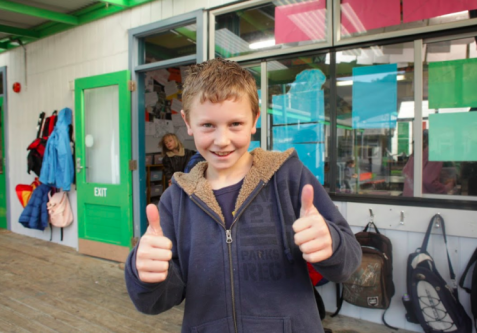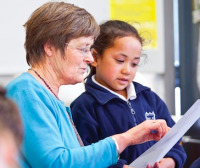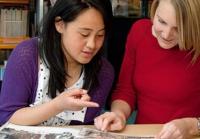Leading my own learning
The learning to learn principle has underpinned curriculum change at Taihape Area School. Students are supported to be independent, self-motivated, reflective, and metacognitive learners through newly adopted teaching and learning approaches.
Creating learning spaces
Anne Kenneally has spent this year experimenting with student designed learning spaces, allowing the students to take the lead in deciding what spaces they need for different activities.
Teachers talk about assessment for learning – Mangere Bridge School
Teachers from Mangere Bridge School talk about sharing assessment data with students. There are links to related videos on next learning steps and helping students take ownership of their learning.
Feedback and critique in art
Nikki Maetzig and Matt Jarry explain the process they use in their art department to help students manage their time and drive their own learning. This process supports students to give and receive effective feedback and critique in order to make improvements to their own work and meet deadlines.
Feedback in a secondary art class
Nikki Maetzig discusses learning to learn in the context of her art classes where students learn how to give and receive feedback. Criticism is an important skill for artists, and the skill of effective critique supports students to be self reflective, plan for improvement in their own work, and to ask each other for help.
Learning to learn: A school-wide approach
Gregor Fountain found that the focus on learning to learn has de-centred the teachers a little as they need to be able to stand back and help the students develop the capacity to find their own answers. He also challenges us to think about what learning to learn might look like in different learning areas.
Students discuss learning intentions
Secondary students from Wellington College and Wellington East Girls' College discuss their experiences with learning intentions. They challenge us to think about how to make these learning intentions more effective.
Students discuss learning to learn strategies
Secondary students from Wellington College discuss the strategies - including peer feedback, real life examples, and exemplars - that help them learn how to learn.
Learning to learn in English
Thorsten Harms from Wellington College discusses some of the strategies he uses in his English classes to help students to learn how to learn.
Developing learning dispositions
Tim Thatcher, from Wellington College, discusses how he helps students to develop learning dispositions through inquiry learning.
Creating a positive learning culture
Kathryn Hutchison from Wellington East Girls' College discusses how she creates a positive learning culture. She explains how exemplars, modeling, collaboration, and learning conversations are integral to helping students learn how to learn.
Learning to learn and inquiry
Ricky Prebble from Wellington East Girls' College discusses the role of inquiry teaching and learning in his social sciences programme. He unpacks the elements of inquiry that support the learning to learn principle, specifically how inquiry encourages students to explore why they are learning and how they are learning.
How teachers can help us learn
Students from Wellington College answer the question, "How can teachers help you learn?".
Students and their learning at the centre
Rebecca Logan from Wellington East Girls' College discusses how she centres her lessons around her students with group work and time for inquiry. This allows her to have conversations with them about how they are learning. The result is that the students are much more able to reflect on and grow their learning capacity. The capturing of student voice in this story gives a valuable insight into how students see effective teaching.






